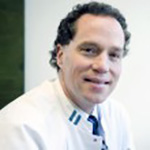Prof. Dr. Alexander Geurts
 Alexander Geurts received both his MD (1987) and PhD (1992) degree in medical sciences at the Radboud University in Nijmegen. He was registered as a physiatrist by the European Board of Physical Medicine and Rehabilitation in 1997 and as a clinical epidemiologist in the Netherlands (SMWBO) in 2001. Since 1992, he continued his main research in balance, gait and motor recovery with a focus on neurorehabilitation, especially the rehabilitation after stroke and in patients with neurodegenerative and neuromuscular diseases.
Alexander Geurts received both his MD (1987) and PhD (1992) degree in medical sciences at the Radboud University in Nijmegen. He was registered as a physiatrist by the European Board of Physical Medicine and Rehabilitation in 1997 and as a clinical epidemiologist in the Netherlands (SMWBO) in 2001. Since 1992, he continued his main research in balance, gait and motor recovery with a focus on neurorehabilitation, especially the rehabilitation after stroke and in patients with neurodegenerative and neuromuscular diseases.
Since 1998, he has been (co-) chair of several national research programmes in neurorehabilitation funded by the Netherlands Organisation for Health Research and Development (ZonMw) (“Recovery of gait after stroke” 1998-2005; “Cognitive rehabilitation” 2000-2007; “Restore4Stroke” 2010-2015; www.restore4stroke.nl) as well as principle investigator in several other national research consortia funded by ZonMw (“Explicit-stroke” 2008-2015; www.explicit-stroke.nl; “Facts-2-NMD” 2008-2015).
In 2005, he became full professor and chair of the Department of Rehabilitation at the Radboud University Medical Center and, since 2009, he was appointed as principal investigator (PI) at the Donders Institute for Brain Cognition and Behaviour of the Radboud University (www.ru.nl/donders). In 2011 he was also appointed as principal lecturer (PL).
Since many years, Alexander Geurts has a clinical and scientific affiliation with the rehabilitation centre of the St Maartenskliniek and with rehabilitation centre Tolbrug (Den Bosch). He is member of the scientific advisory board of the Dutch Brain Foundation (www.hersenstichting.nl),vice-president of the Dutch Society for Neurorehabilitation (DSNR; www.neurorehab.nl), clinical leader of the programme Neurophysiological Devices within the IMDI Neurocontrol (www.neurocontrol.nl), and board member of the Dutch Society for Rehabilitation Medicine (VRA; www.revalidatie.nl). He has (co-)authored more than 150 peer-reviewed Medline registered articles in various areas of neurorehabilitation.
